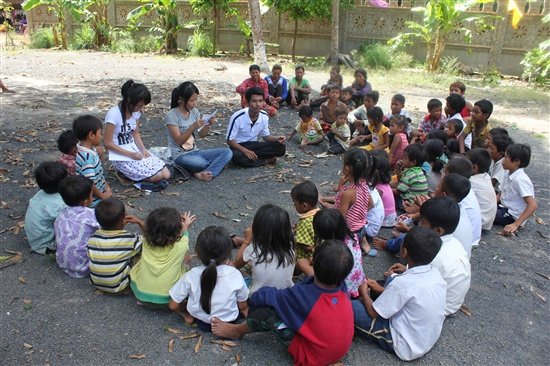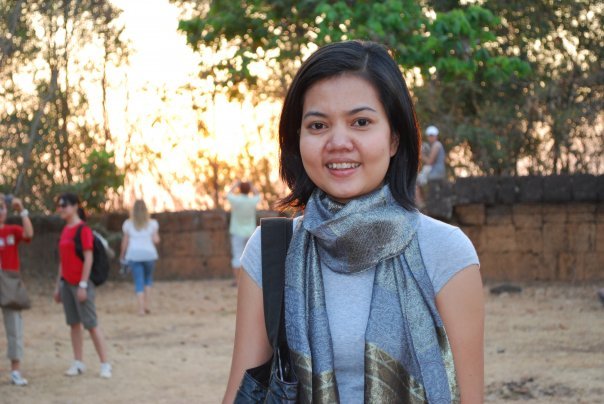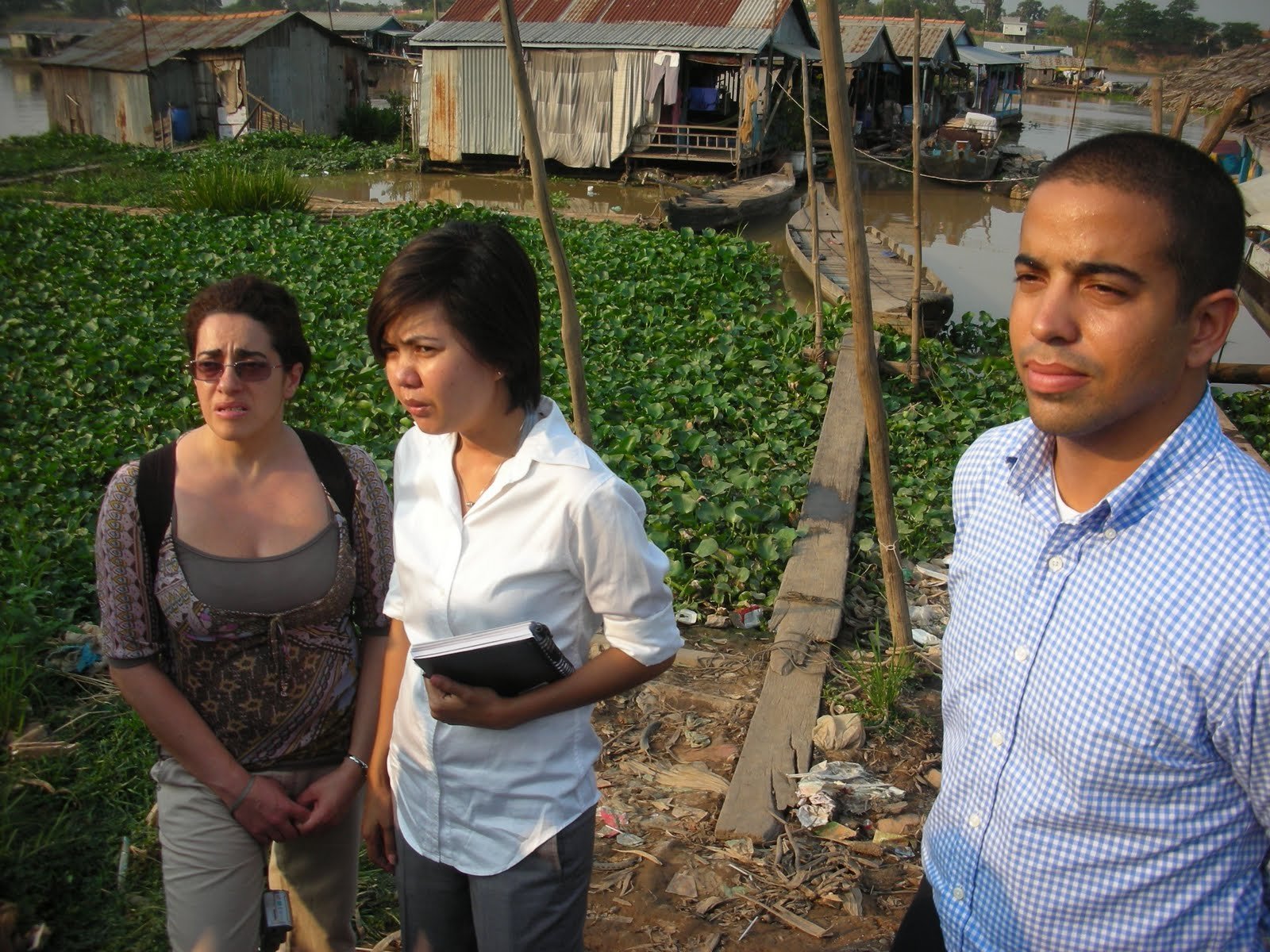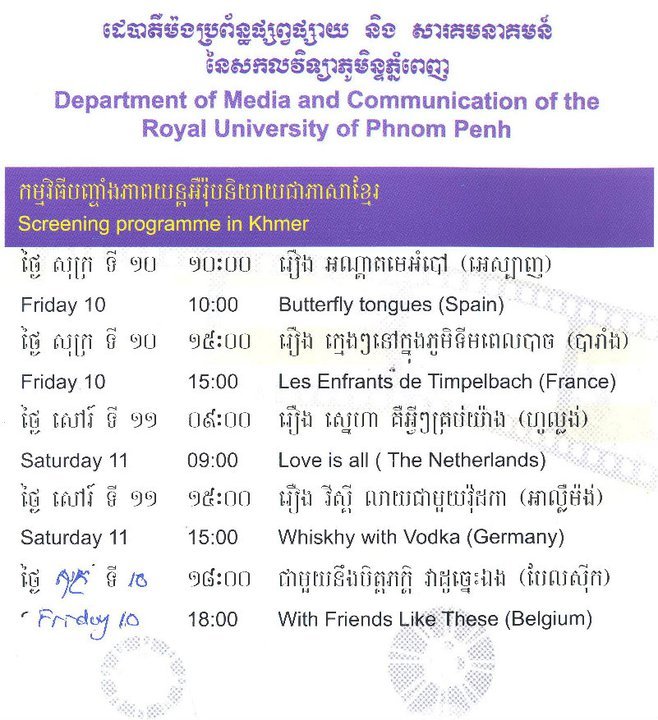In this week issue of LIFT magazine, I wrote a column about situation of library in the Kingdom in related to reading culture of Cambodian.Recently, under supervision from their teacher, year I students in batch 10 at DMC have been to Kampong Cham province to meet with hundreds of children telling important of reading and encouraging them to read by providing some reading materials.
Dareth Rosaline, one of the DMC year I, has written a reflection piece to describe activities she and her classmates did during the community field trip.
Since the original post is in Khmer, so it takes time to translate into English. I will publish another version of this post in English after finishing translation. Cheers,
នៅក្នុងសង្គមកម្ពុជា វប្បធម៌នៃការអាន ត្រូវបានគេមើលឃើញថានៅមានកម្រិតទាបនៅឡើយបើប្រៀបធៀបទៅនឹងប្រទេសដទៃទៀត។ ដោយមើលឃើញពីចំណុចខ្វះខាតយ៉ាងនេះ និងដើម្បីចូលរួមលើកតម្កើងវប្បធម៌នៃការអានដល់កុមារា និងកុមារី និស្សិតមួយក្រុមនៃសាកលវិទ្យាល័យភូមិន្ទភ្នំពេញ ផ្នែកប្រពន្ធ័ផ្សព្វផ្សាយ និងសារគមនាគមន៏បានបង្កើតនូវសកម្មភាពជួយសហគមន៏ ដោយមានការសហការជាមួយនឹងលោកគ្រូ សំបូរ មាណ្ណារា ដែលជាអ្នកមានបទពិសោធច្រើនឆ្នាំក្នុងកិច្ចការជួយ សហគមន៏។ គម្រោងសកម្មភាពដែលពួកយើងបានបង្កើតឡើងនៅពេលនេះគឺសម្រាប់កុមារ៉ា កុមារីនៅស្រុកនគរក្នុង ខេត្តកំពង់ចាម ដោយយើងបានជ្រើសរើសយកបរិវេណក្នុងវត្តនគរក្នុងធ្វើជាទីតាំង និងមានការចូលរួមពីកុមារប្រហែលជា១៦០ទៅ២០០នាក់។ លើសពីនោះ យើងក៏ទទួលបានការចូលរួមពីសំណាក់អាណាព្យាបាល ក៏ដូចជាមេភូមិផ្ទាល់ផងដែរ។
សកម្មភាពចាប់ផ្តើមឡើងដោយ និស្សិតទាំងអស់ត្រូវបានបែងចែកជាក្រុម ដោយមួយក្រុមៗត្រូវចែករំលែកនូវចំនេះដឹងដល់កុមារចំនួនប្រហែលពី១៥ទៅ២០នាក់។បន្ទាប់ពីការចែលរំលែកចំនេះដឹងដល់កុមារ យើងក៏មានការសួរសំនួរចម្លើយយករង្វាន់ ក៏ដូចជាសកម្មភាពផ្សេងៗទៀតជាច្រើនដើម្បីផ្តល់ការសប្បាយដល់ពួកគេ។ នៅចុងបញ្ចប់នៃសកម្មភាពទីមួយ ក្រុមពួកយើង និងកុមារា កុមារីទាំងអស់គ្នាបាននាំគ្នាសំអាតសហគមន៏រួមគ្នាដោយម្នាក់ៗបានរើស សម្រាម ហើយនិងប្រមូលកាកសំណល់ផ្សេងៗដាក់ក្នុងថង់ធំៗ រួចយកវាទៅដុតចោល។
ក្រោយមក សកម្មភាពទីពីរក៏បានចាប់ផ្តើមឡើង ដោយពួកយើងទាំងអស់គ្នាបានបន្តដំណើរទៅកាន់សហគមន៍មួយទៀតក្នុងស្រុកតំបែរខេត្តកំពង់ចាម។ លើកនេះយើងត្រូវអនុវត្តសកម្មភាពជាមួយនឹងកុមារដែលមានអាយុចាប់ពី៨ឆ្នាំទៅ១៦ឆ្នាំ។ មិនមានលក្ខណៈខុសពីទីតាំងទីមួយប៉ុន្មានទេ ព្រោះថានៅទីនេះយើងក៏មានការ លើកយកនូវរឿងនិទានល្អៗមកអាននិងបង្ហាញដល់កុមារទាំងអស់ ដើម្បីឱ្យពួកគេចាប់ផ្តើមមានគំនិតស្រលាញ់និងចូលចិត្តអានសៀវភៅ ។ការច្រៀងចម្រៀងផ្សេងៗ ក៏ដូចជាការសម្តែងរឿងជាលក្ខណៈអប់រំ ក៏ត្រូវបានធ្វើឡើងបន្ទាប់ពីមានការនិទានរឿងឱ្យពួកគេស្តាប់។ដើម្បីជាការលើកទឹកចិត្ត និងជំរុញឱ្យពួកគេមានគំនិតស្រលាញ់ការអានសៀវភៅ និស្សិតទាំងអស់ក៏មានជានំចំណី និងរបស់របរសិស្សាបន្តិចបន្ទួចសម្រាប់ក្មេងដែលបានចូលរួម។ ភាពសប្បាយរីករាយ និងស្នាមញញឹមដាក់គ្នាទៅវិញទៅមកយ៉ាងស្និតស្នាល ក៏បានកើតមានឡើងទាំងសម្រាប់អ្នករៀបចំកម្មវិធី ទាំងសម្រាប់អ្នកចូលរួមផងដែរ។
នៅម៉ោងប្រហែលជា៦ល្ងាច រាល់សកម្មភាពនៃការចែករំលែកទាំងអស់ត្រូវបានបញ្ចប់ ដោយបន្សល់ទុកឱ្យអ្នករៀបចំកម្មវិធីម្នាក់ៗ នូវការពេញចិត្តចំពោះសកម្មភាពដែលខ្លួនបានធ្វើ ដោយហេតុថាវាជាការរួមចំណែកក្នុងការអភិវឌ្ឍសង្គមជាតិ ទោះជាតិចក្តីច្រើនក្តី។
បន្ទាប់ពីធ្វើសកម្មភាពស្ទើរពេញមួយថ្ងៃរួចមក ពួកយើងទាំងអស់គ្នានិងលោកសាស្រ្តាចារ្យមានការអស់កំលាំងគ្រប់ៗគ្នាប៉ុន្តែពួកយើងទាំងអស់គ្នាមិនទាន់អាចសំរាកបានទេព្រោះយើងនូវមានកាតព្វកិច្ចចុងក្រោយសំរាប់ថ្ងៃនោះគឺការចំអិនអាហារពេលល្ងាចតាមក្រុម។ដោយសារតែពួកយើងទាំងអស់គ្នាបានត្រៀមរួចជាស្រេចនូវមុខម្ហូបនិងគ្រឿងផ្សំនៃម្ហូបទាំងនោះ ពួកយើង បានចាត់ចែងធ្វើម្ហូបយ៉ាងរហ័សរហួនតាមក្រុមនីមួយៗ។
សកម្មភាពក្នុងពេលចំអិនអាហារត្រូវធ្វើឡើងដោយលាយឡំនឹងការសើចសប្បាយរីករាយពីសមាជិកនៃក្រុមនីមួយៗ បានបង្ហាញនូវការចុះសម្រុងនិងការចេះជួយគ្នាទៅវិញទៅមកដើម្បីសម្រេចនូវគោលបំណងរួមមួយ បើទោះបីជាពួកយើងកំពុងហត់នឿយយ៉ាងណាក៏ដោយ។
រយះពេលមួយម៉ោងបានមកដល់ក្រុមនីមួយៗក៏បានធ្វើរួចរាល់នូវមុខម្ហូបដែលពួកគេ បានរៀបចំ។ក្រុមនីមួយៗបានយកម្ហូបរបស់ពួកគេមកដាក់ជុំគ្នារួចអធិប្បាយបង្ហាញពីម្ហូបតាមក្រុមទៅកាន់សមាជិកនៃក្រុមដទៃទៀត។ក្រោយពីបញ្ចប់នូវការអធិប្បាយមកពេលវេលាដែលពួកយើងទាំងអស់គ្នាទន្ទឹងរង់ចាំបានមកដល់។ មុខម្ហូបជាច្រើនបានតម្រៀបគ្នានៅចំពីមុខពួកយើង។ដោយភាពអស់កម្លាំងនិងនឿយហត់ ពួកយើងបានញុំាអាហារទាំងអស់នោះគ្មានសល់ក្នុងរយពេលដ៍ខ្លី។សំណើចនិងភាពសប្បាយរីករាយរបស់ពួកយើងទាំងអស់គ្នាក៍បានលេចឡើងក្នុងពេលកំពុងញុំាអាហារជុំគ្នាផងដែរ។ក្រោយពេលបញ្ចប់ការញុំាអាហារវាគឺជាពេលដែលពួកយើងទាំងអស់អាចសម្រាកដើម្បីយកកំលាំងសំរាប់សកម្មភាពនៅថ្ងៃស្អែក។ដោយសារតែការអស់កម្លាំងតាំងពីថ្ងៃសមាជិកពួកយើងខ្លះបានលង់លក់យ៉ាងស្កប់ស្កល់ តែអ្នកខ្លះទៀតបានអង្គុយនិយាយគ្នានិងលេងល្បែងសប្បាយៗជុំគ្នាស្របពេលដែលពួកគេកំពុងរង់ចាំចូលបន្ទប់ទឹកដើម្បីងូតទឹកសំអាតខ្លួន។រហូតដល់ពេលអាធ្រាតបន្តិចពួកយើងរៀបចំរួចរាល់អស់ហើយក៍នាំគ្នាចូលគេងទាំងអស់គ្នាតែម្តង។ពេលវេលាគេងរបស់ពួកយើងគឺពិតជាខ្លីមែនទែនបើប្រៀបធៀបទៅនឹងពេលធ្វើសកម្មភាព ព្រោះពួកយើងត្រូវក្រោកពីព្រលឹមរៀបចំខ្លួននិងញុំាអាហារពេលព្រឹកអោយបានមុនម៉ោង៨ព្រឹក។បន្ទាប់មកពួកយើងបានជួបជុំគ្នានិយាយអំពីអ្វីដែលយើងទាំងអស់គ្នាទទួលបានក្នុង
កំឡុងពេលដែលពួកយើងធ្វើក្នុងសហគមន៍រួចពួកយើងបានបន្តដំណើរទៅធ្វើសកម្មភាពចុងក្រោយគឺការចាប់ក្តាមនៅវាលស្រែ។ក្រោយពេលការចាប់ក្តាមបាន បញ្ចប់ពួកយើងក៍បានរួសរាន់ធ្វើដំណើរត្រលប់មកទីក្រុងភ្នំពេញវិញ។
ក្នុងដំណើរត្រលប់មកវិញភាពរីករាយនៅតែមានហើយការអស់កំលាំងក៍នៅតែសល់ទើបនាំអោយមានអ្នកខ្លះគេងលក់នៅក្នុងឡានស្របពេលដែលអ្នកខ្លះទៀតកំពុងច្រៀងដើម្បីបង្កើតបរិយាកាសរីករាយក្នុងឡាន។ក្រោយចំណាយពេលប្រហែលបួនម៉ោងក្នុងការធ្វើដំណើរពួកយើងបានមកដល់ភ្នំពេញវិញហើយក៍បានបំបែកគ្នាទៅផ្ទះរៀងៗខ្លួនជាមួយនិងទឹកមុខញញឹមស្រស់ស្រាយ។
ក្រោយពីបានបញ្ចប់នូវសកម្មភាពជួយសហគមន៍របស់ពួកយើង ខ្ញុំអាចយល់បានថាវាគឺជាពេលវេលាដែលមានតម្លៃនិងមានសារសំខាន់បំផុតសំរាប់ខ្ញុំផ្ទាល់ សំរាប់សហគនម៍ និងសំរាប់សង្គមផងដែរ។វាគឺជាពេលវេលាមួយដែលអាចអោយខ្ញុំបានចែករំលែកនូវចំនេះដឹងដែលខ្ញុំដឹងនិងភាពសប្បាយរីករាយអោយទៅដល់កុមារាកុមារីតូចៗរស់នៅជនបទដាច់ស្រយ៉ាល។មិនតែប៉ុណ្ណោះក្នុងកំឡុងពេលនោះដែរ វាអាចអោយខ្ញុំស្វែងយល់ពីតម្រូវការជីវិតនិងការរស់នៅរបស់ប្រជាជនក្នុងសហគមន៍នោះផងដែរ។ចំនុចដែលសំខាន់មួយទៀតនោះគឺអាចធ្វើអោយខ្ញុំដឹងពីការធ្វើអ្វីដោយឯករាជ្យ ការចេះជួយទៅវិញទៅមក និងការសហការគ្នាយ៉ាងល្អដើម្បីសំរេចនូវគោលការរួមមួយជាមួយគ្នា។សកម្មភាពចុះសហគមន៍នេះគឺជាពេលវេលាដែលខ្ញុំមិនអាចបំភ្លេចបាន និងចង់បន្តធ្វើវាជាបន្តបន្ទាប់នៅពេលអនាគត។
សកម្មភាពនោះវាមិនត្រឹមតែមានតម្លៃសម្រាប់ខ្ញុំនោះទេ តែវាក៍មានតំលៃសំរាប់សហគមន៍នោះផ្ទាល់ផងដែរ ព្រោះថាវាអាចធ្វើអោយមានភាពកាន់តែជិតស្និតរវាងប្រជាជន រស់នៅក្នុងសហគមន៍ដាច់ស្រយ៉ាលនិងប្រជាជនទីក្រុង។ក្រៅពីនោះពួកគេទាំងអស់គ្នាក៍អាចទទួលបាននូវពត៌មានផ្សេងៗអំពីទីក្រុងនិងអាចបង្ហាញប្រាប់ពួកយើងវិញនូវតម្រូវការរបស់ពួកគេដល់យើងទាំងអស់គ្នាផងដែរ។
លើសពីនោះទៅទៀតសង្គមក៍នឹងអាចទទួលបាននូវការអភិវឌ្ឍន៍ដោយសារសកម្មភាពរបស់ពួកយើងដែរ ព្រោះថាសង្គមបានទទួលនូវការយកចិត្តទុកដាក់ពីសំណាក់យុវជនខ្មែរដែលជាទំពាំងស្នងឬស្សី។ពួកយើងអាចបង្ហាញអោយសង្គមដឹងពីផលិតផលដែលប្រជាជនមាននិងតម្រូវការរបស់ប្រជាជនក្នុងសហគមន៍នោះ ដូច្នេះសង្គមនឹង ចាត់វិធានការជាមួយនិងសហគមន៍យ៉ាងល្អ។វាក៍ជាវិធីដែលផ្សាភ្ជាប់ទំនាក់ទំនងរវាងសង្គមនិងសហគមន៍តាមតំបន់ដាច់ស្រយ៉ាលឱ្យកាន់តែមានភាពជិតស្និត មិនមានគម្លាតឆ្ងាយដាច់ពីគ្នាពេកនោះដែរ។
Related articles
- Libraries a brilliant learning resource (saoyuth.wordpress.com)







